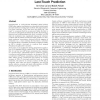Free Online Productivity Tools
i2Speak
i2Symbol
i2OCR
iTex2Img
iWeb2Print
iWeb2Shot
i2Type
iPdf2Split
iPdf2Merge
i2Bopomofo
i2Arabic
i2Style
i2Image
i2PDF
iLatex2Rtf
Sci2ools
120
click to vote
ISCA
2000
IEEE
2000
IEEE
Selective, accurate, and timely self-invalidation using last-touch prediction
Communication in cache-coherent distributed shared memory (DSM) often requires invalidating (or writing back) cached copies of a memory block, incurring high overheads. This paper proposes Last-Touch Predictors (LTPs) that learn and predict the “last touch” to a memory block by one processor before the block is accessed and subsequently invalidated by another. By predicting a last-touch and (self-)invalidating the block in advance, an LTP hides the invalidation time, significantly reducing the coherence overhead. The key behind accurate last-touch prediction is tracebased correlation, associating a last-touch with the sequence of instructions (i.e., a trace) touching the block from a coherence miss until the block is invalidated. Correlating instructions enables an LTP to identify a last-touch to a memory block uniquely throughout an application’s execution. In this paper, we use results from running shared-memory applications on a simulated DSM to evaluate LTPs. The results in...
Related Content
| Added | 31 Jul 2010 |
| Updated | 31 Jul 2010 |
| Type | Conference |
| Year | 2000 |
| Where | ISCA |
| Authors | An-Chow Lai, Babak Falsafi |
Comments (0)

